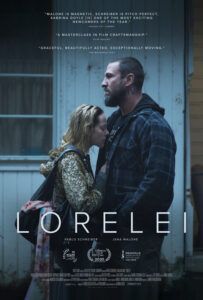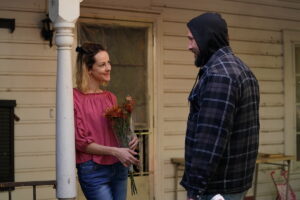Film Review: The Siren Song of “Lorelei” Mostly Enchants
Written by: Christopher Llewellyn Reed | July 29th, 2021

Lorelei (Sabrina Doyle, 2020) 3 out of 4 stars.
15 years ago, Wayland committed armed robbery, and is just now finishing his subsequent sentence. Greeted by his old biker gang as he emerges from prison, he has one fun, drunken night with them before beginning a work residency at the local Lutheran church, where Pastor Gail, kind soul that she is, overlooks his late arrival while also firmly reminding him of his upcoming duties, which include neither alcohol nor drugs on the premises.
A dreary life awaits him in these Portland, Oregon, suburbs, until his high-school sweetheart, Dolores (aka Lola), now a single mom of three, shows up for one of Gail’s therapy sessions. Lola and Wayland reconnect, in fits and starts, and a different future now looms ahead for the ex-con. It won’t be easy to get there, however; not for him, not for her, and certainly not for her children. But watching everyone fumble their way forward is the great joy of Lorelei, an often effective, sometimes flawed, debut feature from writer/director Sabrina Doyle.

Pablo Schreiber (The Devil Has a Name), as Wayland, puts his hulking body and expressive face to excellent use, doing much with Doyle’s frequently sparse dialogue. Mixing despair, anger and occasional humor, he’s a man undone by his past who can’t quite figure out how to recapture the lost promise of youth. As Lola, Jena Malone (The Public) perfectly captures a restless spirit who urgently wants to love again, yet feels life slipping away under the twin pressures of parenting and working a dead-end job. In Wayland, she sees both a symbol of former sins and possible redemption. But hopes and dreams can end just as easily in disappointment as in glory. More often, they lead to somewhere in between. There will be no Hollywood ending here (though we actually do end in Hollywood), but rather something far more realistic, and therefore more satisfying.
Beyond the two lead adults, it’s the three kids who shine the most. Chancellor Perry plays the eldest, Dodger, who is biracial; Amelia Borgerding plays the middle child, Perry (short for Periwinkle); and Parker Pascoe-Sheppard plays the baby, Denim, a current boy showing increasing signs of being trans. Though young, they each bring strong personalities to their parts. All their names have Blue at the end, named for different shades of Lola’s favorite color. She’s not only drawn to blue, but to water. A competitive swimmer years earlier, she wants nothing more than to be by the sea. Portland is close, but not close enough. In the final act of the movie, she makes a fateful decision based on this innermost desire that will either lead to disaster or new possibilities.

All the while, there is Doyle’s mostly assured direction, which carries us past some of the more clichéd interactions and unbelievable moments. Her clear conviction that everyone, everywhere, is capable of change and deserving of second (or third, or fourth, or more) chances lends Lorelei a delightfully humanistic quality. People are not always who or what they seem; surprises are in store for those who go by first impressions. And the title? Well, yes, there is a siren song awaiting. It enchants and leads us to a more exciting tomorrow. What’s not to love about that?

